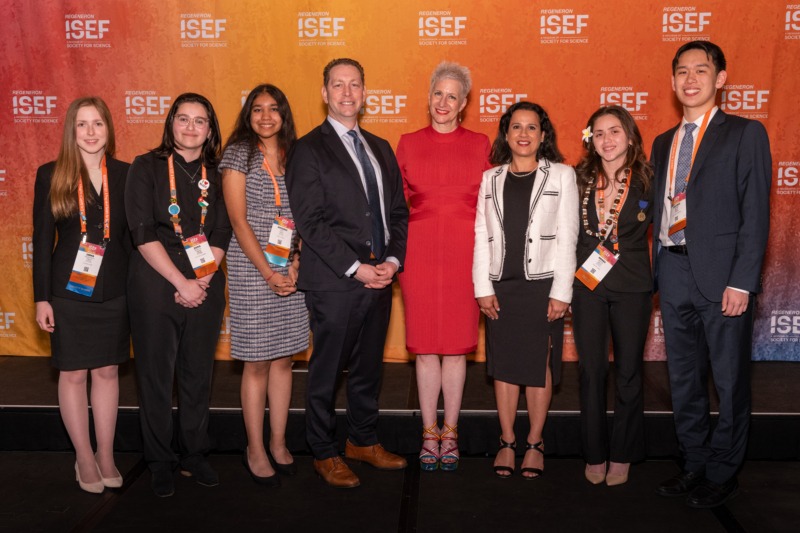DCAT Awards Scholarships to Student Scientists at the 2023 Regeneron International Science & Engineering Fair
The Drug, Chemical & Associated Technologies Association (DCAT) awarded 25,000 USD in scholarships to five student scientists who participated in the Regeneron International Science & Engineering Fair (Regeneron ISEF), the world’s largest international pre-college science competition. The event, which provides a global stage for the best and brightest young scientists and engineers around the world, was held last month, May 15–18, 2023, in Dallas, Texas.

Regeneron ISEF 2023 brought together more than 1,600 finalists from 64 countries, regions, and territories who competed for more than $9 million in total awards and scholarships,
The DCAT Science & Scholarship Committee facilitated DCAT’s participation as a Special Awards Organization at Regeneron ISEF. DCAT’s participation allows the organization to invest in the bio/pharmaceutical industry’s future by supporting young scholars who represent the geographic regions and areas of study reflected in the global membership of DCAT.
Winning Projects
A task force of the DCAT Science & Scholarship Committee selected the following winning projects and awarded each of the five recipients with 5,000 USD in scholarship funding from DCAT to support their future education. The winning students and their projects are outlined below.
Amara Kanoelani Martin (Kamehameha Schools Kapalama Campus, Honolulu, Hawaii) was recognized for her research on quantifying the effects of low, average, and high therapeutic dosages of lithium bicarbonate on human embryonic kidney (HEK293) cells as a tool in identifying and mitigating renal toxicity of lithium used as a treatment for bipolar disorder. The study sought to improve understanding of lithium-induced nephrotoxicity as a means to prevent the development of chronic kidney disease in patients administered lithium to treat bipolar disorder. The study further examined the potential mitigating effects of administering aspirin in combination with lithium carbonate. The study’s results suggested that aspirin supplementation for bipolar disorder patients on lithium therapy may reduce nephrogenic toxicity. See Amara’s project video here.
Anouska Seal (Paul J. Hagerty High School, Oviedo, Florida) was recognized for developing and evaluating a novel polymeric coating to combat bone implant infection. Bone implants have a risk factor for infection mostly caused by Staphylococcus aureus, a bacterium that can lead to a bone infection called osteomyelitis, which is caused by biofilm formation on the implant that is difficult to treat due to antibiotic resistance. The research involved engineering a novel, multi-faceted polymeric coating incorporating certain active antimicrobial proteins to combat bone implant infection. See Anouska’s project video here.
Zaina Daaboul (Little Rock Central High School, Little Rock, Arkansas) was recognized for creating an ionic combination drug and using photothermal therapy as a treatment that would address antibacterial resistance against the bacterium, Escherichia coli. The ionic combination drug combined norfloxacin and IR-780 dye, a photosensitizer that allows for photothermal therapy to occur. Photothermal therapy involves shining a near-infrared light on bacteria, which inhibits formation of bacteria through the generation of heat. When tested against certain other treatments, the study showed that the dual mechanism treatment decreased the amount of bacterial growth compared to other treatments and did not require a high concentration, thereby showing potential in combating antibacterial resistance. See Zaina’s project video here.
Emma Markowitz (Maine Homeschool, Trevett, Maine) was recognized for developing and evaluating a biodegradable, antimicrobial wound dressing, With the increase in obesity and diabetes, there is a critical need for innovative wound-care strategies that accelerate healing and recovery and limit the use of antibiotics through wound-monitoring technology. The research involved the development of a promising multi-functionalized, antimicrobial-bacterial cellulose-manuka honey-loaded dressing for treating and monitoring wounds. See Emma’s project video here.
George Cheng (North Carolina School of Science and Mathematics, Durham, North Carolina) was recognized for research that provided proof-of-concept, in-vitro, and in-vivo data for a microRNA-loaded wearable microneedle patch for controlling Type 2 diabetes. The research combined recent advances in microRNA technology and applied novel microRNA-based lipid nanoparticle loading and a microneedle hyaluronic chain-linked drug-infusion method, DiaMiR (Diabetes MicroRNA injected Reparation). Testing in mice models, one DiaMiR microneedle patch lowered blood glucose levels in diabetic mice for 3-4 days, showed no toxicity in the treated mice, and did not induce inflammation, thereby offering a potentially promising approach to controlling Type 2 diabetes. See George’s project video here.
About the DCAT Science & Scholarship Committee
The DCAT Science & Scholarship Committee is responsible for identifying the needs of today’s students and educators and provides them with assistance through a variety of projects, grants, and DCAT Member Company-supported initiatives, including the DCAT Annual Golf Outing, which will be held later this month on Monday June 26, 2023, at the TPC Jasna Polana golf course in Princeton, New Jersey. More information about the DCAT Annual Golf Outing, can be found here.

